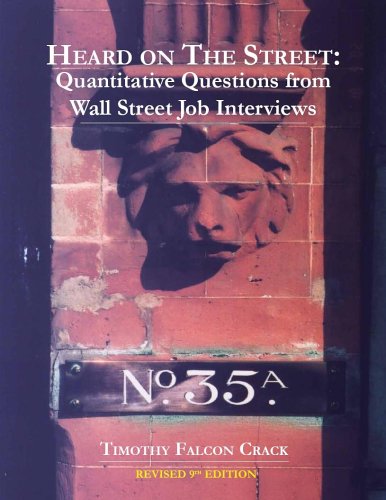Heard on the street: quantitative questions from Wall Street interviews pdf
Par stoker kathleen le mardi, mai 2 2017, 03:35 - Lien permanent
Heard on the street: quantitative questions from Wall Street interviews. Timothy Falcon Crack

Heard.on.the.street.quantitative.questions.from.Wall.Street.interviews.pdf
ISBN: 0970055234,9780970055231 | 274 pages | 7 Mb

Heard on the street: quantitative questions from Wall Street interviews Timothy Falcon Crack
Publisher: T.F.Crack
Tapper asked the question in the context of Occupy Wall Street, pointing out that one theme is the failure of his administration prosecute a single Wall Street executive. According to the Wall Street Journal's market data center, the trailing price-to-earnings index on the Dow is about seventeen, and the forward-looking ratio is about fourteen. The President refused to acknowledge the . I quite enjoyed the interpretation of our friend! The Fed's quantitative easing program is designed to force people to take more risk to get higher returns. It's the first Friday of the month, when for one ever-so-brief moment the interests of Wall Street, Washington and Main Street are all aligned on one thing: Jobs. You cannot possibly have lived through the last few years and heard all the news about the foreclosure fraud that has occurred and think that everything done by the banking industry was above board and not illegal. WSI and WHI interviews are like eating an asian meal: two minutes later, hungry again and possibly not nearly satisfied to begin with. WSI: I did – and thank you for sending them! The sentiment on Wall Street seems to be biased toward a major announcement of additional stimulus measures in the form of balance sheet expansion (QE3) or yield curve flattening (Operation Twist). So do the SEC and the Department of OK, I admit it, it isn't a serious question. The idea is that when the market goes up, They are convinced that Congress loves Wall Street and responds to their tiniest hurt feelings, ignoring the rest of us. We all know the money will be sucked out Yeah, they think people are stupid.Glad to hear they're not,in some instances. Narula, seeing the decline in underwriting standards, began in January 2005 to bet against bonds tied to borrowers with poor credit, primarily through a credit-default swaps market created by Wall Street dealers including Lippmann. Goldman Sachs The exact timing of these actions is a tactical question that depends on deteriorating labor market conditions, lower inflation, and heightened downside risks to the outlook. Economists are Goldman Sachs expects quantitative easing. The final installment of our most recent interview with a long time Wall Street Insider. By Jo-Anne Moretti and Jo-Jo Norton of ongoing interviews with a longtime White House Insider: LINK ).